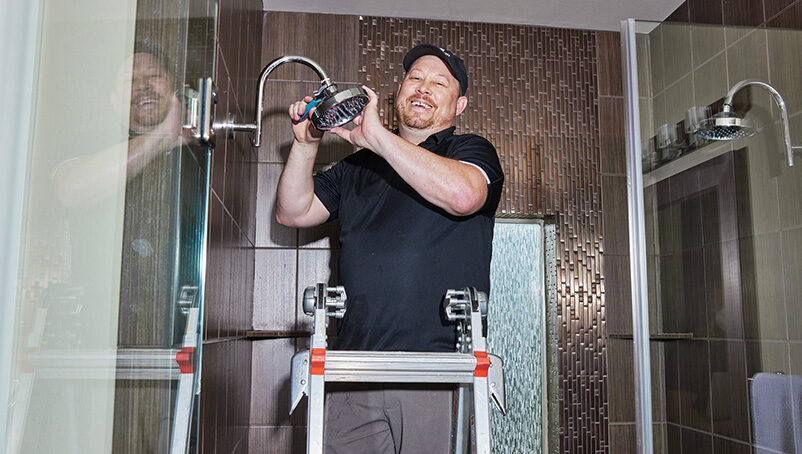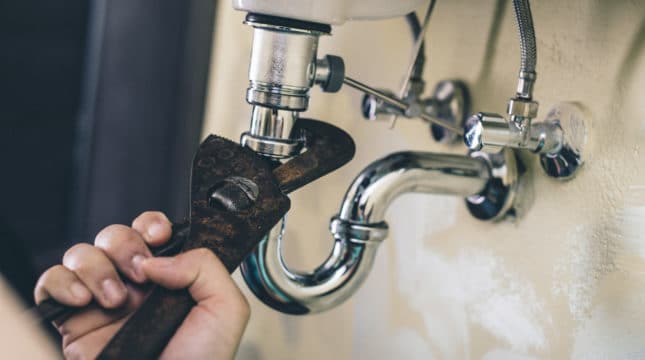How to get a plumbers license in California
When you apply for a California contractor license, you’ll need to complete the following steps:
- Verify your work experience
- Submit your fingerprints
- Include the application fee
- Pass two exams
- Pay the license fee
Work experience
Fill out the Certification of Work Experience form to verify your past work experience as a plumber. More details about the work experience requirements are included below.
Fingerprints
The CSLB requires a full set of fingerprints for each applicant to run a criminal background check. You must complete the fingerprinting process through Live Scan, which is available at most local police departments and public Live Scan sites.
Application fee
You must include a nonrefundable fee of $450 with your California plumber license application.
Plumbing exams
You’ll need to pass two licensing exams after your application has been approved. The business and law exam covers business management and construction law, while the trade exam covers practical plumbing skills and knowledge of plumbing systems.
Both plumbing exams use a multiple-choice, closed-book format. The CSLB provides study guides online. You must take both exams at an official testing site.
License fee
After successfully passing both examinations, you must submit a payment to have your license issued. This fee equals $200 for a sole owner or $350 for a non-sole owner.
Your California plumbing license will expire every two years. You’ll receive a renewal application from the CSLB about two months before the scheduled expiration date. You can also find your expiration date on your license pocket card or use the CSLB’s California plumber license lookup tool.
You must pay a renewal fee of $450 for sole owners or $700 for non-sole owners.
Do you need a license to be a plumber in California?
To become a plumber, you must get a C-36 specialty contractor license from the California Contractors State License Board (CSLB). This license permits you to work on projects valued at $500 or more.
The state of California allows licensed plumbing contractors to work on projects that provide “a means for a supply of safe water, ample in volume and of suitable temperature for the purpose intended and the proper disposal of fluid waste from the premises in all structures and fixed works,” such as:
- Water and gas piping
- Piping, storage tanks and venting
- Gas appliances, flues and gas connections
- On-site waste disposal systems
- Water heaters (including solar equipment)
- Health and safety devices (such as gas control valves, water conditioning equipment)
California plumbing license requirements
To qualify for a plumbing license, California residents must have a minimum of four years of experience as a plumber in one or more of the following positions:
- Journeyman
- Foreman
- Supervising employee
- Contractor
- Owner-builder
All work experience must be verified by a qualified individual, such as an employer, contractor, foreperson, supervisor, union representative, building inspector or engineer.
No education requirements apply for this contractor classification. However, you may receive credit for up to three years of required experience for completing technical training, apprenticeship training or education.
Hazardous substance removal certification
As a licensed plumbing contractor, you must have a hazardous substance removal certification if you plan to perform any type of hazardous substance removal work, such as installing or removing an underground storage tank.
You must apply to the CSLB and submit a nonrefundable $125 application fee to obtain this certification. You’ll also need to pass a hazardous substance removal exam.
Processing times for contractor applications in California vary based on several factors. To ensure prompt processing, submit a complete application with all entries filled out correctly and all forms, signatures and fees included.
The CSLB website offers a way to check your application status online.
Insurance for California plumbers
Plumber insurance can help protect you financially. The following types of business insurance in California are available for licensed plumbers.
General liability insurance
California general liability insurance can help provide coverage for some of the most common types of work-related accidents, like damage to someone’s property and client injuries.
Workers’ compensation insurance
As a California plumbing contractor, you must have workers’ compensation insurance to get your license. This insurance can help cover lost wages and medical expenses if you or an employee gets hurt on the job.
You must fulfill the workers’ compensation insurance requirement to maintain your plumbing contractor license. Submit a certificate of insurance with the CSLB listed as the Certificate Holder. Make sure to obtain your workers’ comp coverage through an insurance company licensed through the California Department of Insurance.
Plumbing contractors without employees are exempt from the requirement but must file a Workers’ Compensation Insurance Exemption form with the registrar.
Tools and equipment insurance
Tools and equipment insurance can help cover the cost of repairs and replacements for stolen or damaged work gear.
Commercial auto insurance
If you drive for work, commercial auto insurance can help cover accident-related costs, such as property damage and medical bills.
Commercial property insurance
Commercial property insurance can help cover repairs if a property you own or rent for your plumbing business is damaged or vandalized.
Reciprocity for a CA plumbers license
California has a reciprocity agreement with Arizona for plumbing licensure. California’s C-36 classification for licensed plumbing contractors corresponds to the following Arizona license classifications:
- C-37
- C-37R
- K-37
- K-77
- L-37
- L-77
Plumbers with one of these classifications may apply for reciprocity with California if their Arizona license has been active and in good standing for the last five years. Use the Request for Verification of License form to fill out the correct information and submit it with your application.
Approved reciprocal licensees must still take the law and business exam, but the trade exam is typically waived.
California plumber license bond requirements
Submitting a bond or cashier’s check for $25,000 is one of the final steps to getting a plumbing license in California. Acceptable bonds must come from an insurance agent or a private holding company listed by the California Department of Insurance.
How NEXT helps support California plumbers
NEXT offers affordable self-employed plumber insurance for licensed contractors in California. We’ll make sure you have the plumbing business insurance to satisfy California licensing requirements.
Use our online services from any computer or mobile device to learn more about costs, get a quote, and apply for coverage. It takes about 10 minutes to complete the process and get a certificate of insurance.
Get an instant quote online today.






